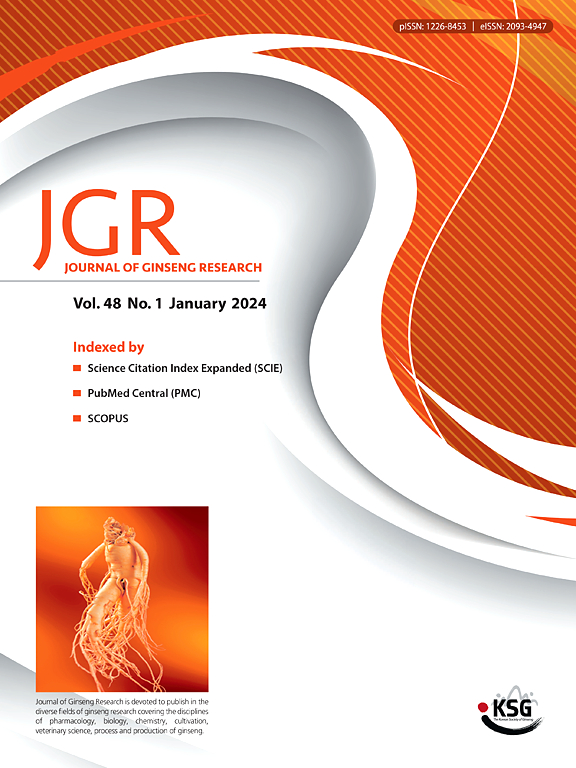高丽参通过靶向癌细胞和成纤维细胞,阻止肺癌的发展
IF 6.8
2区 医学
Q1 CHEMISTRY, MEDICINAL
引用次数: 0
摘要
背景尽管抗癌药物有效,但患者经常出现复发、转移和耐药。一种有希望的治疗方法不仅针对癌细胞生长,而且还调节支持恶性肿瘤的癌症相关成纤维细胞。化合物K (CK)是红参的代谢物,具有抗癌作用。最近,我们开发了一种富含ck的红参提取物(CKP),并通过抑制癌细胞增殖和使成纤维细胞失活来探索其抑制肺癌的潜力。方法采用MTT法和集落形成法评价CKP体外抑制肺癌细胞增殖的效果。采用Western blot和流式细胞术观察CKP对肺癌细胞的凋亡作用。此外,通过Western blot、RT-PCR和伤口愈合实验研究了CKP抑制TGF β1诱导的癌细胞迁移的能力。此外,通过Western blot和RT-PCR分析检测CKP对肺成纤维细胞失活的影响。在体内实验中,采用异种移植物模型,将肺癌细胞和肺成纤维细胞结合在异种移植物中。结果sckp显著降低TGF-β1刺激的A549细胞的增殖和侵袭性,表明其具有灭活肺成纤维细胞的潜力。此外,CKP抑制活化成纤维细胞分泌白细胞介素-6、白细胞介素-8、TGF-β1等细胞因子。在体内,CKP显著抑制异种移植模型的肿瘤生长。结论CKP可有效诱导肺癌细胞凋亡,抑制转移,使成纤维细胞失活,从而阻止肿瘤侵袭,减少细胞外基质的产生,是一种新型抗癌药物。本文章由计算机程序翻译,如有差异,请以英文原文为准。

Compound K-enriched Korean red ginseng prevents lung cancer progression by targeting cancer cells and fibroblasts
Background
Despite the efficacy of anticancer drugs, patients frequently experience relapse, metastasis, and resistance. A promising therapeutic approach not only targets cancer cell growth but also modulates cancer-associated fibroblasts, which support malignancies. Compound K (CK), a metabolite derived from red ginseng, has demonstrated anticancer properties. Recently, we developed a CK-enriched red ginseng extract (CKP) and explored its potential to suppress lung cancer by inhibiting cancer cell proliferation and inactivating fibroblasts.
Methods
To evaluate the in vitro efficacy of CKP in inhibiting lung cancer cell proliferation, MTT and colony formation assays were performed. The apoptotic effects of CKP on lung cancer cells were assessed using Western blot and flow cytometry. Furthermore, the ability of CKP to inhibit TGF β1-induced migration of cancer cells was investigated through Western blot, RT-PCR, and a wound healing assay. Additionally, the impact of CKP on lung fibroblast inactivation was examined via Western blot and RT-PCR analysis. For in vivo experiments, a xenograft model was utilized, incorporating a combination of lung cancer cells and lung fibroblasts in xenografts.
Results
CKP significantly reduced the proliferation and invasiveness of TGF-β1-stimulated A549 cells, demonstrating its potential to inactivate lung fibroblasts. Additionally, CKP inhibited the secretion of cytokines, such as interleukin-6, interleukin-8, and TGF-β1, by activated fibroblasts. In vivo, CKP markedly inhibited tumor growth in the xenograft model.
Conclusion
In conclusion, CKP effectively induced apoptosis in lung cancer cells, suppressed metastasis, and inactivated fibroblasts, thereby preventing cancer invasion and reducing extracellular matrix production, highlighting its potential as a novel anticancer agent.
求助全文
通过发布文献求助,成功后即可免费获取论文全文。
去求助
来源期刊

Journal of Ginseng Research
CHEMISTRY, MEDICINAL-INTEGRATIVE & COMPLEMENTARY MEDICINE
CiteScore
11.40
自引率
9.50%
发文量
111
审稿时长
6-12 weeks
期刊介绍:
Journal of Ginseng Research (JGR) is an official, open access journal of the Korean Society of Ginseng and is the only international journal publishing scholarly reports on ginseng research in the world. The journal is a bimonthly peer-reviewed publication featuring high-quality studies related to basic, pre-clinical, and clinical researches on ginseng to reflect recent progresses in ginseng research.
JGR publishes papers, either experimental or theoretical, that advance our understanding of ginseng science, including plant sciences, biology, chemistry, pharmacology, toxicology, pharmacokinetics, veterinary medicine, biochemistry, manufacture, and clinical study of ginseng since 1976. It also includes the new paradigm of integrative research, covering alternative medicinal approaches. Article types considered for publication include review articles, original research articles, and brief reports.
JGR helps researchers to understand mechanisms for traditional efficacy of ginseng and to put their clinical evidence together. It provides balanced information on basic science and clinical applications to researchers, manufacturers, practitioners, teachers, scholars, and medical doctors.
 求助内容:
求助内容: 应助结果提醒方式:
应助结果提醒方式:


